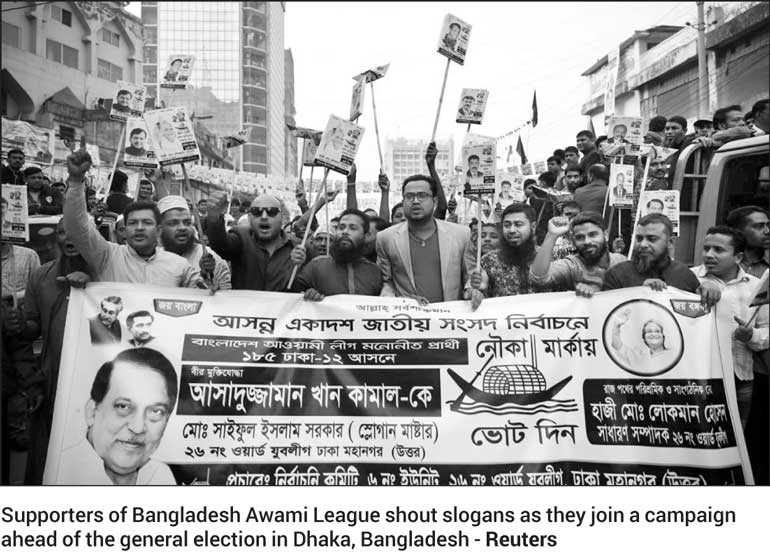Monday Feb 23, 2026
Monday Feb 23, 2026
Saturday, 29 December 2018 00:00 - - {{hitsCtrl.values.hits}}

DHAKA (Reuters): Campaigning for Bangladesh’s general election ended on Friday after weeks of violence, mainly against workers and officials from an opposition alliance, that has drawn criticism from the United States and others.
Prime Minister Sheikh Hasina’s Awami League is seeking its third straight term in Sunday’s election against the main opposition Bangladesh Nationalist Party (BNP), which boycotted the last vote in 2014.
The Awami League is promoting its economic record over the past decade but a BNP-led opposition alliance, many of whose leaders have been jailed, has vowed to remove curbs on the media, increase wages and freeze energy prices.
“The government has lost moral support,” BNP Secretary-General Mirza Fakhrul Islam Alamgir told reporters on Thursday, urging voters to “restore democracy”.
“But the people are with us. They want change,” he said.
The BNP’s preparations have been hamstrung by the February jailing of its chairwoman, former prime minister Khaleda Zia, on what the party called trumped-up corruption charges.
Leaders of the ruling Awami League deny any misuse of power and say they will return to government with an overwhelming majority.
Hasina told supporters on Thursday they must “ensure victory of pro-liberation forces”, a reference to Bangladesh’s war of independence from Pakistan in 1971 led by her father, Sheikh Mujibur Rahman.
The Economist Intelligence Unit expects her party to win a third term.
The BNP said on Thursday more than 8,200 opposition leaders and activists from a coalition of about 20 parties had been arrested since the election schedule was announced early last month.
Four workers were killed and more than 12,300 injured, it said.
The Awami League has in turn said the BNP and its partners were behind attacks that killed at least six of its workers over the past three weeks.
Police declined to confirm the figures.
Mahbub Talukdar, one of five election commissioners, has said there has not been a level playing field, although other commissioners have said they expected the election to be free and fair.
Earl Miller, the US ambassador to Bangladesh, said all parties had been victims of violence, including women and minority candidates.
“However, it appears opposition party candidates have borne the brunt of most violence,” he said in a statement after meeting Election Commission officials on Thursday. Miller said all candidates and voters must be able to take part without “harassment, intimidation, or violence” and that an independent media must be allowed to cover the election.
The Telecommunication Regulatory Commission ordered the shutdown of high-speed mobile internet services in a bid to curb the spread of “confusing content”, spokesman Zakir Hussain Khan told Reuters.
Facebook and Twitter said last week they had removed accounts and fake news pages linked to the government that had posted anti-opposition content.
The United Nations has called for a “peaceful, credible and inclusive poll”.